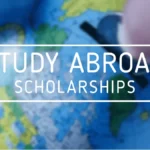Best undergraduate scholarships in 2025 that cover tuition fees and offer monthly stipends are a dream come true for students who want to earn their degree without the stress of financial burdens. These scholarships are not just about covering your classes—they often pay for your books, accommodation, and even living expenses throughout your education journey. If you’re ready to take your academic future seriously and want to save money while studying, this guide is for you.
In this article, we’ll walk you through the top undergraduate scholarships for 2025 that offer full tuition coverage and monthly stipends, how to apply, eligibility criteria, and helpful tips to increase your chances of success.
Why Fully Funded Scholarships Matter in 202
The cost of college is rising across the globe. Many talented students give up their dreams due to financial barriers. Fully funded scholarships can change this. They don’t just reduce costs—they remove them entirely.
Benefits of These Scholarships:
- 100% tuition coverage
- Monthly living stipends
- Travel and book allowances
- Health insurance and accommodation support
- Global exposure and networking opportunities
Whether you’re from a low-income background or simply want to avoid student loans, these scholarships are a game-changer.
Top Fully Funded Undergraduate Scholarships in 2025
Let’s explore the best programs around the world that fund your full undergraduate degree.
1. Lester B. Pearson International Scholarship – Canada
What it offers:
- Full tuition for 4 years
- Books and academic fees
- Housing support
- Monthly stipend
Eligibility:
- International students with excellent academic performance
- Demonstrated leadership and community involvement
- Nominated by your high school
Deadline:
- November 2025
2. MEXT Scholarship – Japan
What it offers:
- Tuition fee waiver
- Monthly living allowance (~¥117,000 or $800)
- Airfare and accommodation support
- Japanese language and cultural training
Eligibility:
- Must apply through Japanese embassies or consulates
- Academic excellence and high school graduation certificate required
3. KAIST Undergraduate Scholarship – South Korea
What it offers:
- Full tuition fees
- Monthly stipend of KRW 350,000 (~$260 USD)
- One-time airfare reimbursement
- Medical insurance
Eligibility:
- Open to international students in STEM fields
- Proficiency in English or Korean
4. Türkiye Scholarships – Turkey
What it offers:
- 100% tuition coverage
- Monthly stipend (~$130)
- Free accommodation
- Airfare and health insurance
Eligibility:
- Applicants from eligible countries
- Minimum academic score of 70%
5. Eiffel Excellence Scholarship – France
What it offers:
- Tuition support through French institutions
- Monthly stipend of €1,181
- Health insurance
- Return trip airfare
Eligibility:
- Must apply through a participating French university
- Academic excellence and clear career goals
6. UCL Global Undergraduate Scholarship – UK
What it offers:
- Full tuition fees
- Monthly living allowance (~£1,200)
- Accommodation aid
Eligibility:
- International students from low-income backgrounds
- Academic merit and financial need required
7. ANU Chancellor’s International Scholarship – Australia
What it offers:
- Up to 100% tuition fee reduction
- Living stipend in some cases
- Relocation support
Eligibility:
- High-achieving international students
- Apply directly to the Australian National University
8. ETH Zurich Excellence Scholarship – Switzerland
What it offers:
- Full tuition waiver
- Monthly allowance of CHF 12,000 per semester (~$13,000 per year)
Eligibility:
- Outstanding academic performance in science or engineering
- Admission into ETH Zurich undergraduate program
How to Apply for These Scholarships
Winning a fully funded undergraduate scholarship requires strong preparation and early action.
Step 1: Research Scholarships That Match Your Profile
Start by identifying programs based on:
- Your academic background
- Language proficiency (English, Japanese, French, etc.)
- Preferred country or university
- Financial need or merit-based criteria
Step 2: Gather Required Documents
Prepare:
- High school transcripts
- Letters of recommendation
- Personal statement or essay
- Passport copy
- English language test scores (IELTS/TOEFL if needed)
Step 3: Apply Before the Deadline
Each scholarship has a different deadline. Most top ones close between October 2024 and March 2025. Always double-check with the official website.
Step 4: Prepare for Interviews or Additional Tests
Some scholarships might involve:
- Online interviews
- Aptitude or language tests
- Written essays or assignments
Tips to Win These Scholarships
Getting a top scholarship is competitive, but the right approach increases your odds.
1. Focus on Your Essay
Your personal statement tells your story. Be honest, compelling, and focused on your goals.
2. Highlight Extracurriculars and Leadership
Most scholarships are looking for well-rounded students. Include:
- Volunteering experience
- Leadership roles in school clubs
- Social impact or community service
3. Get Strong Letters of Recommendation
Choose teachers or mentors who know you well. Give them enough time and information to write a meaningful letter.
4. Practice for Interviews
Be prepared to answer questions like:
- Why do you deserve this scholarship?
- What are your academic goals?
- How will you contribute to your university?
Conclusion
Best undergraduate scholarships in 2025 that cover tuition fees and offer monthly stipends are a life-changing opportunity for students who want to study without financial stress. Whether you’re dreaming of a classroom in Canada, a lab in Japan, or a lecture hall in the UK, these scholarships can help make it happen. With the right research, preparation, and determination, you can secure your place and your future.
Frequently Asked Questions (FAQs)
Q1: Can I apply for more than one fully funded scholarship?
Yes. In fact, it’s recommended to apply for multiple scholarships to increase your chances.
Q2: Are these scholarships open to all nationalities?
Most are, but some may have country-specific eligibility. Always check the official scholarship page.
Q3: Do I need to know the local language to study abroad?
Not always. Many programs are offered in English. However, some (like Japan’s MEXT or France’s Eiffel) may require or offer local language training.
Q4: Do scholarships cover travel expenses too?
Many fully funded scholarships include airfare, especially at the start and end of the program.
Q5: What is the average monthly stipend amount?
It ranges between $100 to $1,200 depending on the country and university.
If you’d like this article in downloadable format or want a version specific to your country or academic field, let me know!



